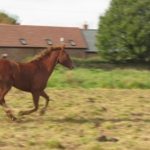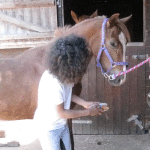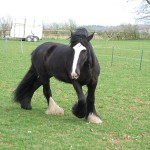Horse care during winter
 The summer is drawing to a close and it is time for horse lovers and owners to plan for the winter that looms ahead. Horses do require special care during these winter months so that they remain free of any illness or discomfort. Though they are very tolerant of cold weather and tend to favor the cold as opposed to heat, it is still advisable to get the basic care routine planned out so that you do not run into any problems going ahead.
The summer is drawing to a close and it is time for horse lovers and owners to plan for the winter that looms ahead. Horses do require special care during these winter months so that they remain free of any illness or discomfort. Though they are very tolerant of cold weather and tend to favor the cold as opposed to heat, it is still advisable to get the basic care routine planned out so that you do not run into any problems going ahead.
Other factors like breed, the age of the horse and the inherent health of the horse do influence the manner in which the horse shapes up during the winter. As a pet owner, it is your responsibility to understand the nature of your horse and prepare your self sufficiently in advance to ensure your pet leads a comfortable existence during the winter months.
The body condition is assessed by feeling the horse over its ribs for any untoward lumps and also through a complete perusal of the body using both hands and eyes to detect any abnormalities. Since the overgrowth of winter hair can conceal any problems, it is crucial to do a labored assessment.
Having done the checking, the starting point of the winter care has to be the hygiene along with proper and adequate immunization before stepping into the winter months. Once the body is free of all fleas or parasites and the horse is properly de wormed, the horse will be able to weather any hardship. Getting a vet to visit is also a worthwhile exercise so that you are able to jointly plan out a health schedule that is customised for your horse.
Another practice is to precondition the horse and prepare it for the cold season. Towards that objective, if your horse does over feed and puts on some extra fat, it is beneficial as it acts as an insulating medium and also accords energy reserve if needed. You therefore need to provide for this extra fat by making appropriate changes in the diet much before winter.
Make sure that the winter coat of hair that starts growing is retained as that is the first line of defense and protection against cold. When allowed to grow to its natural length, this hair acts as a thermal coat and due to the greasy nature of such hair, any ice, sleet and snow is kept away. A thick growth of such hair acts as a natural insulator against adverse winter conditions and horses do not require any other artificial blanket. Hair around the ears and about the fetlocks must be particularly retained as they provide the horse the ability to fluff out and trap layers of warm air to enable them to experience warmth.
If an external blanket has to be chosen, then it is better to go for one that combines the outer and inner layer with an insulating material in between. The modern blankets come with soft synthetic material that is not only windproof but also water repellent. The inner layer is so smooth that it does not cause any problem to the horse despite having to adorn such a blanket for a long period of time. Care must be taken to see that the blanket is removed upon the weather improving so that there is no trapping of sweat within the blanket.







Recent Comments